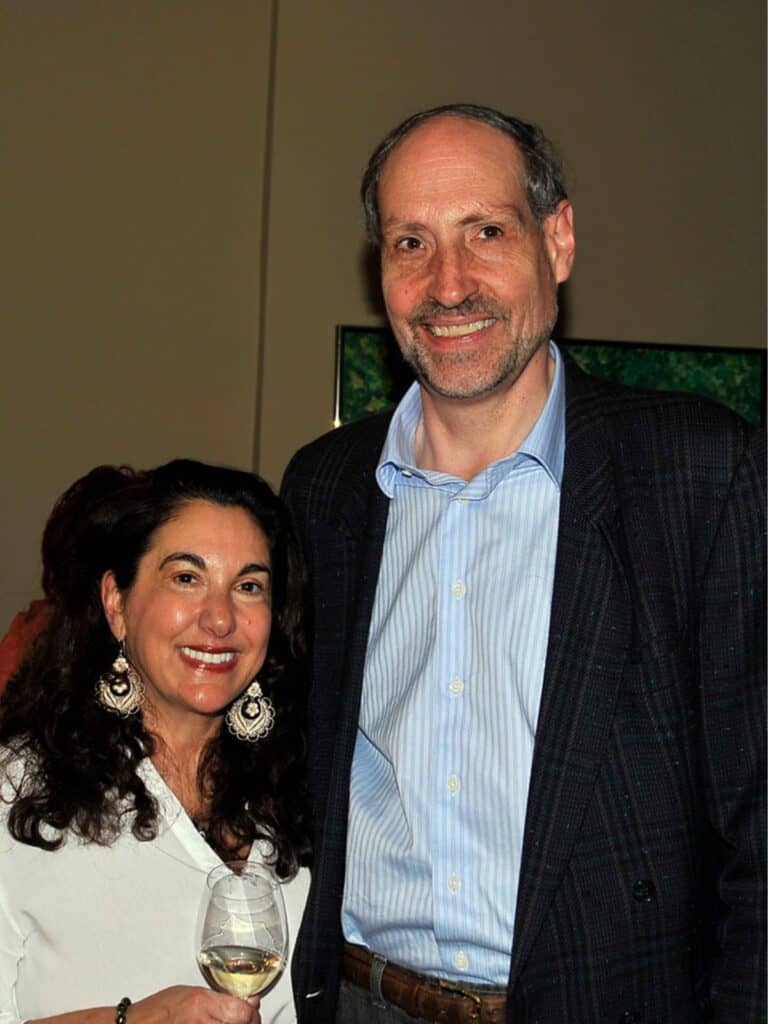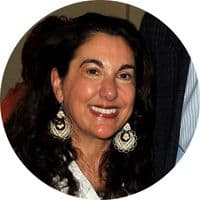The Long & The Short of It: On Marriage and a Crazy Big Height Difference
When my husband and I go out in public—daily, many times a day—we’re assailed with stares, bemused looks, as well as rude, crude, and crazy comments. My favorite after thirty-seven years of marriage: “So how do you… kiss?” Let me explain. Michael stands six foot, eight inches, while I am five-three, which leaves a gap of seventeen inches between our respective statures, or about a foot-and-a-half.

In the early days of our marriage, the gawks of strangers left me feeling furious and exposed. What struck me was how stunned, though not dumbstruck, people were by anyone physically different.
My MO for these uncouth intruders was to rush up into their faces and give them as good as we got: I stared, I made faces, I spewed out my own outrageous comments. They came to, as if from a fugue state, realizing with horror that this freakish couple was in fact, sentient, alive.
Michael, a gentleman, did not care for my manner of dealing with rude strangers. He preferred to hold his head high and go about our business. Throughout our years together, he’s remained patient with the same cliched questions asked again and again, with so little imagination. “Do you play basketball?” How tall are you?” “How’s the air up there?”
A Giant In A Fairytale
Though I met Michael on a blind date during my New York City days, I was prepared for his unusual height by his sister. (She is tall, too.) Helene and I shared a country house with a bunch of singles one summer. She told me her brother was a “super fellow” and asked my permission to give him my number.
Time passed. The tall super fellow didn’t call. I gave Helene a nudge. (I later found out that she’d also given him the numbers of two other women in our house.) More time passed, but eventually, a rather shy guy rang my apartment in Brooklyn and we set up a date to meet at a cozy bistro in the West Village in New York City.
The novelist in me couldn’t wait to meet this giant in a fairy-tale. Six-eight—I couldn’t quite wrap my mind around it.
When I entered the restaurant, there he stood. A handsome man with large dark eyes, a full, expressive mouth, silky black hair falling over his collar, and lovely fair skin. He reminded me of a British boarding school boy all grown up, which in fact, he was. I noticed his hands– manly, well-shaped, carving the air as he spoke—they looked as if they’d been sculpted by Michelangelo. And I loved his voice: deep, calm, and soothing. He listened with a concentrated focused attention I had not experienced with other beaus and that I needed, more than anything.
Over a bottle of Pinot Noir, we told each other our stories. Apparently, I babbled for the first hour until Michael cut in, “Okay, I’ve heard a good deal about you, let me tell you about me.”
That put a tight cork into my monologue. On our first anniversary, I said, “I can’t believe you said that!” He replied, “I didn’t want to be a cipher. I wanted you to know me.”

A Story To Love
I confess I fell in love with Michael’s story before I fell in love with him. I’m a devotee of Victorian literature and Michael’s life might have been penned by Dickens, had Dickens written about Jewish orphans.
He and his sister were raised in London. They never knew their father. Michael and Helene lost their single mother when my husband was only sixteen, his sister, twenty-one. They looked after one another, and later, moved to New York. Michael’s mother, Brana, a Holocaust survivor, died at fifty-two, a legacy of the concentration camps. (She was imprisoned in Terezin, Mauthausen, and Buchenwald.) Brana was a loving, self-sacrificing mother fiercely devoted to her two children. Her life was in them.
Brana was one of nine children born to a Hasidic family in Solotvino, or Slatinske Doly, as she called it, a small rural village nestled in the foothills of the Carpathian mountains in Czechoslovakia. Her father, Mehel, and mother, Chanca, lived in the front room of Grandfather Yankel’s house on Synagogue Street. The family was poor and Mehel supported them doing odd jobs. He was known for his extraordinary height, six feet, five inches. In fact, the family’s last name, “Hoch,” means tall in German.
There were only two other survivors in the Hoch family. A brother escaped into the British army, while a sister was hidden by a righteous Christian family.
Michael, named for the grandfather he never knew, inherited the legacy of tall stature, as have our two children, Tobias (six-three) and Gabriel (five-ten). I suppose, in a way, we are the march of the living tall. That is, except for me.
Survivors
I sensed right away and then learned more deeply over time how Michael’s childhood had both shaped and strengthened him. The contrasts and similarities in our painful upbringings shed light on our mutual compatibility and understandings.
My giant in a fairy-tale didn’t shy away from telling me his story and didn’t flinch when I shared mine: a sad suburban one of divorce, neglect, and madness and a house decorated as a jungle in Hollywood style bad taste. I felt he could take me in and contain everything I had gone through, and though moved, not be shaken. At last, a mensch.
This was a man who would later accompany me to a mental hospital to visit my schizophrenic brother, the person I was closest to throughout childhood—we possessed a secret place, imaginary world, and a private language. He went mad, while I functioned well as the girl with the crazy brother and the secret fear of joining him in madness–it was just a matter of time.
Michael and I are both survivors.
Which brings me to my understanding of what keeps our thirty-seven year marriage going strong. Though we have much underlying commonality–a love of literature and the arts, travel, hiking, not to mention good food and wine– our temperaments are complimentary, perhaps as opposite and contrasting as our respective statures. Where I am a worrier, Michael is tranquil and steady. I fear the worst, running from crazy, while Michael is sensibly sane, and usually optimistic.
At times, I take myself too seriously and Michael has taught me to see the humor—even absurdity–in people and situations. Remember that old show The Odd Couple? Well, I am Felix—everything just so—while Michael is Oscar. Welcome to chez-moi, where clutters and piles of things, promises Michael, “are on their way to where they live.” When stuff is all over the place, you have a humongous mess. Ah well, we live with each other’s quirks.
What have I taught him? To get organized, to figure out what you want and need from life and go for it. To trust intuition and imagination. To give up being Saint Michael.
The strength of our union lies in its resilience.
Six months after we met, we returned to that West Village bistro and Michael got down on one knee and proposed, sliding an engagement ring on my finger, a Deco mosaic of diamonds he’d found in an antique jewelry store. We’ve gone back there for many anniversaries.
Though Michael’s unusual height was the first thing I—and everyone else—noticed about him, today it barely registers, at least when we’re at home with our family. I feel blessed to have put down new roots. These days, the grown-up British boarding school boy looks almost rabbinical, with a black beard and those dark, kind eyes that drew me in the first place. For the two of us with families blown to pieces by the centrifugal forces of evil and trauma, our marriage is home.







